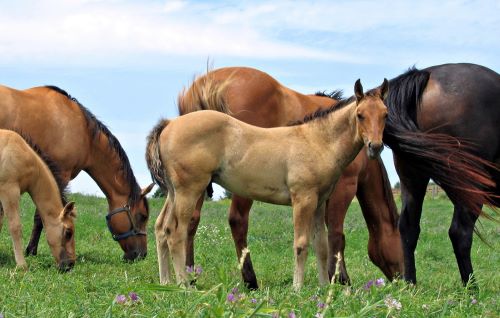

Some horse owners express concerns about feeding alfalfa to their horses because they worry about contributing to hot behavior, effects on the calcium-to-phosphorus ratio of the diet, and whether alfalfa causes enterolith formation.
Some of these concerns are not supported by research, while others can be managed by properly balancing the diet with the inclusion of alfalfa. Non-Structural Carbohydrates Alfalfa has developed a reputation as a forage that is not appropriate for metabolic horses. Some horse owners believe it should not be fed to horses with Equine Metabolic Syndrome because it has NSC content.
Alfalfa is typically higher in energy density than grass hay, but the higher energy content does not come from non-structural carbohydrates. Several studies have compared alfalfa hay with other hays such as Orchard, teff, wheat, and oat. In general, the NSC content of alfalfa is lower than grass or cereal hays. Other factors such as drought, cold stress, the stage of maturity and the time of day when the hay is cut have a greater impact on the NSC content of the hay than plant species.Submitting your hay for forage analysis is recommended to determine NSC content. Enteroliths High proportions of alfalfa in the diet (greater than 50 – 70% of dry matter) are associated with a risk of enterolith formation. Enteroliths are mineral-based stones that form in the intestines when a horse consumes an indigestible foreign object. Horses fed high-alfalfa diets have higher colonic mineral concentrations and lower colonic pH, which may explain the heightened risk of enteroliths.
However, most horses fed a high alfalfa diet do not develop enteroliths, so the higher risk may not be due to alfalfa consumption alone. Additional factors such as a lack of pasture access could lead to enterolith formation. If your horse needs alfalfa in their diet, a properly balanced feeding plan and good management practices can go a long way to preventing the development of enteroliths.
Hoof Sensitivity
Anecdotal reports suggest some laminitis-prone horses may be sensitive to alfalfa inclusion in the diet. Alfalfa intake appears to trigger laminitis episodes in susceptible horses. It is unclear why this occurs but could be due to excess protein intake from alfalfa hay. High protein intake can alter hindgut function, which could influence gut health and inflammation. In addition, elevated amino acids in the blood following alfalfa intake can stimulate insulin secretion, affecting laminitis risk. If your horse is prone to laminitis, it may be advisable to switch to grass hay if you notice increased hoof sensitivity when fed alfalfa. Respiratory Irritation Some horse owners express concerns that alfalfa hay makes their horse cough.
However, it is not the alfalfa hay itself but rather the dust or mold content of any hay that can aggravate respiratory conditions such as heaves. The dustiness of hay is related to the moisture content. Drier alfalfa hay will tend to be dustier as the leaves are more likely to shatter.
Alfalfa hay is generally baled at a higher moisture level than grass hays. This keeps a higher proportion of leaves intact, which ensures a high protein hay. However, if stored or handled incorrectly, the higher moisture content can lead to more mold and mycotoxins, which can irritate the respiratory tract. Regardless of the type of forage, always evaluate your hay for the presence of dust and mold. Dusty hay can be soaked or steamed to reduce respiratory irritants. Look out for brown or grey spots in the hay which can indicate mold and avoid feeding this hay. Blister Beetles Blister beetles are a pest commonly found in Midwestern states such as Kansas, Oklahoma and Colorado. They are attracted to blooming forages, such as alfalfa. These beetles produce a toxin called cantharidin which can be deadly for horses. Horses that consume alfalfa contaminated with blister beetle fragments or oils from the beetle may show signs of gastrointestinal or urinary irritation, including:
• Blisters on the tongue and mouth
• Colic and diarrhea
• Problems with urination or blood in the urine
Talk to your hay provider about the presence of blister beetles in their fields, especially if your hay is from the mid-western US